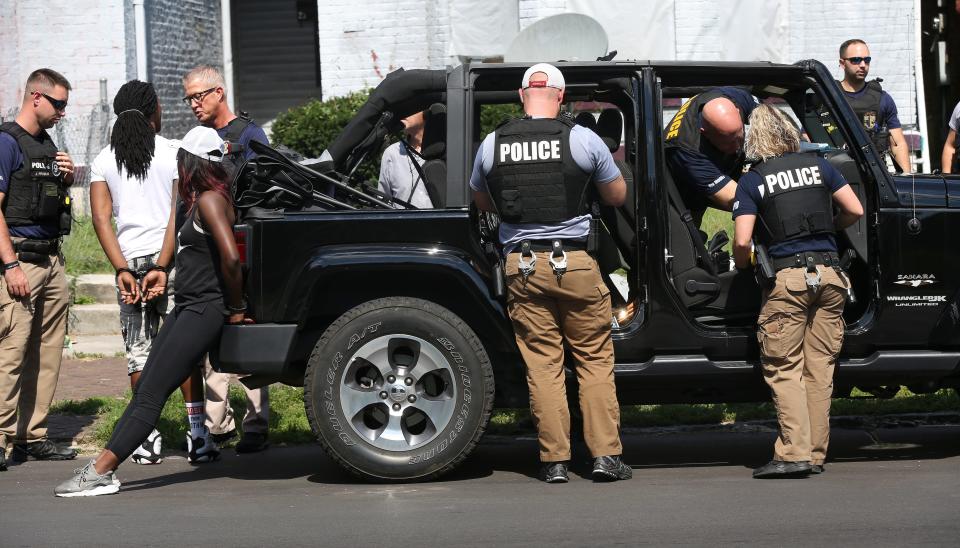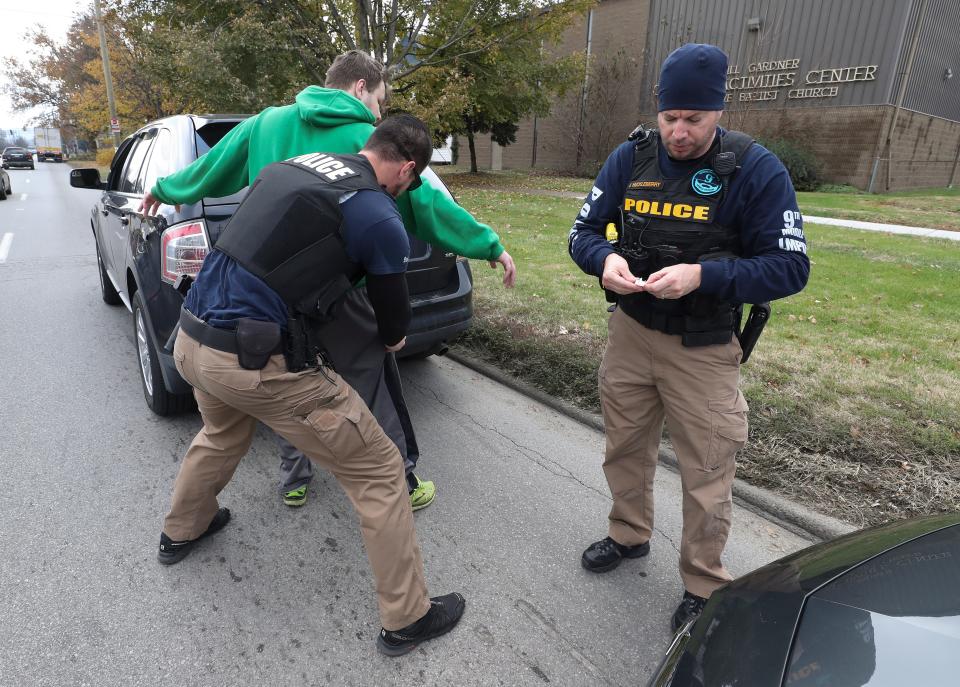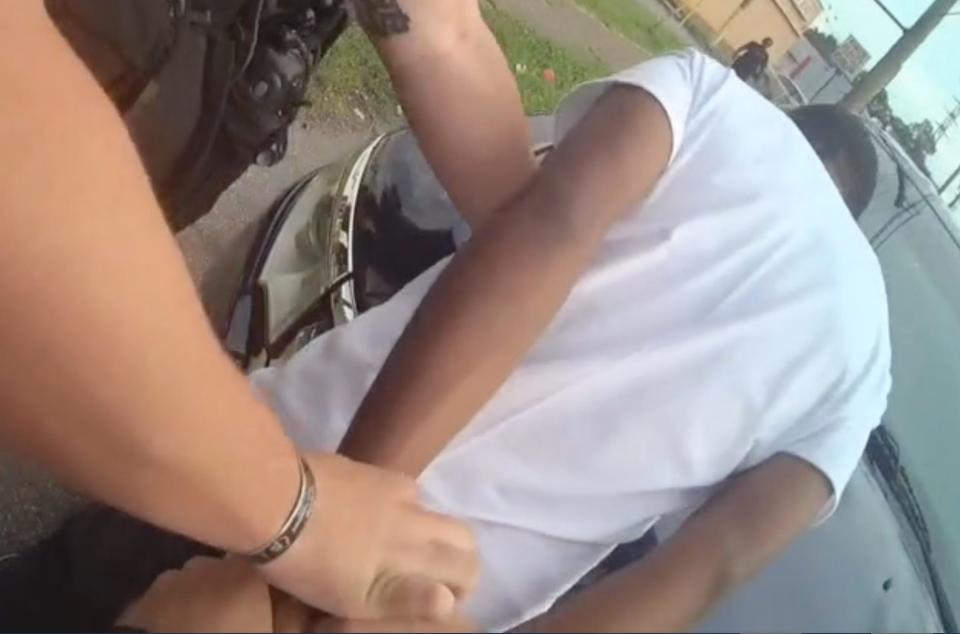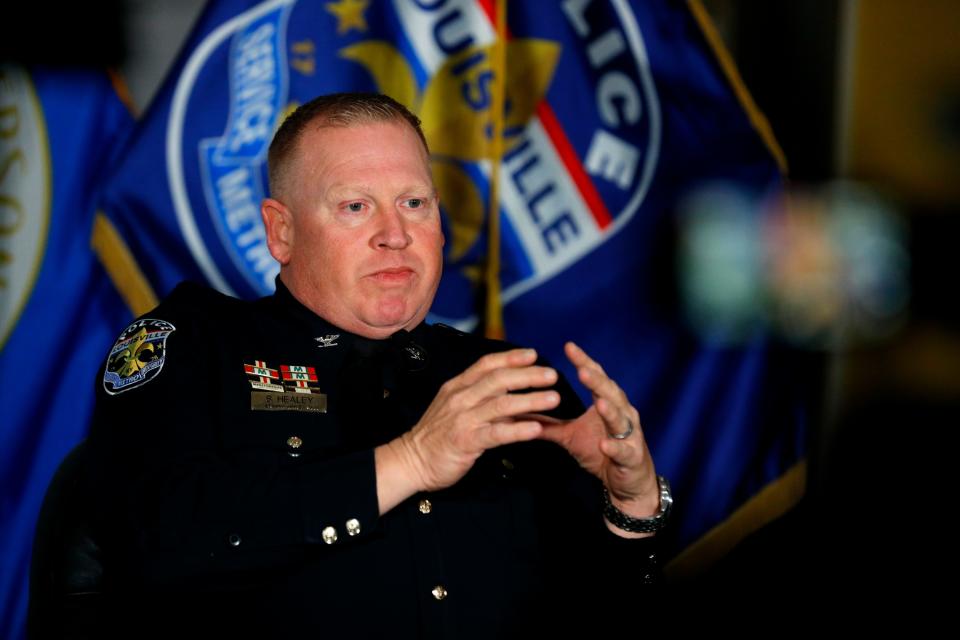How a group of LMPD officers went from 'elite unit' to dousing pedestrians with drinks
On paper, they were called VIPER and, later, Ninth Mobile — elite police units driving unmarked cars tasked with getting guns and drugs off the streets of Louisville’s most dangerous neighborhoods.
But on the street, they were “jump-out boys,” a moniker used for similar units elsewhere in the U.S., including Baltimore, where Gun Trace Task Force officers robbed drug dealers, planted evidence on innocent people and ultimately had their actions detailed in an HBO series.
In Memphis earlier this year, Tyre Nichols died after SCORPION officers pulled him over and beat him.
Like their counterparts, Louisville’s jump-out boys would become known for brutality, abusing authority and dragnet-style policing that deepened distrust in the community.
“The reputation was they were getting a lot of guns off the street. They were making a lot of arrests,” Louisville Metro Police Deputy Chief Steve Healey, who was in a separate narcotics unit when those units existed, said in an interview. “You didn’t really hear about all of the other stuff until you would see the news reports come out, you would see the complaints come out.”
Ninth Mobile’s arc is a cautionary tale of what can happen when statistics-driven police units — used in cities hoping to show progress against crime by upping gun and drug seizures — operate with little supervision and their own rules.
The culmination in Louisville involved officers driving around the city randomly targeting and assaulting civilians by throwing drinks at them from unmarked vehicles.
They recorded their assaults on cell phones to share with colleagues in a group text or by huddling around phones during breaks.
“That’s really bad. And it’s such a petty way, that it makes it almost worse, because it does reflect horrible contempt for the community,” said Peter Moskos, a former Baltimore Police officer who is a professor at the John Jay College of Criminal Justice in New York, about the attacks.
While many Ninth Mobile officers knew about the misconduct, nobody reported it, including a supervisor who was in the group texts where videos were shared.
One early career officer told investigators he concluded that behavior was normal in elite units.
The unit disbanded in 2019. But as Louisville continues to try to move past the 2020 police killing of Breonna Taylor — and LMPD continues to promise reform with a federal consent decree looming — the legacy of Ninth Mobile provides a glimpse at how difficult change may be.
'How 'bout a drink?'
One night in September 2018, two Ninth Mobile officers driving an unmarked cruiser in Park Hill spotted a woman walking on the sidewalk alongside a warehouse.
“She going to get this mother f-----. She gonna get all of this,” said one officer as they pulled a U-turn on Dixie Highway to catch up with the woman.
“Don’t miss… get her!” said the other, just before a takeout fountain drink went flying out the window and the officers sped off.
The assault was among 24 unique incidents The Courier Journal has identified in which Ninth Mobile officers launched unprovoked attacks on civilians by throwing drinks.
The Courier Journal was able to geolocate 18 of the attacks; all but one took place in Louisville’s West and South ends, historically disadvantaged areas of the city. One happened just a quarter-mile from Ninth Mobile’s headquarters.
In October 2022, former Ninth Mobile officers Curt Flynn and Bryan Wilson were sentenced to federal prison for carrying out drink-throwing attacks, which occurred over the course of more than a year and came to be known as "Slushygate."
After an internal investigation, which was launched after the federal charges were filed, LMPD Chief Jacquelyn Gwinn-Villaroel suspended four officers who knew about the attacks but did not report them, as well as a fifth who acted as a driver for the attacks.
Internal documents show at least three more Ninth Mobile officers were involved in a text thread where attack videos were shared but quit the force before the end of the investigation.
Among them was Kelly Goodlett, who pleaded guilty to a federal charge for conspiring to include false information in the warrant application for Breonna Taylor’s apartment. Gwinn-Villaroel wrote in September that Goodlett would have been terminated over Slushygate had she not resigned.
Under Kentucky’s open records law, The Courier Journal obtained cell phone videos of attacks, as well as other misconduct, like Ninth Mobile officers mocking a man with apparent behavioral health issues or driving out of their way to splash pedestrians with puddles.
Their publication by The Courier Journal marks the first time the Slushygate videos have been made publicly available.
In one incident, officers recorded themselves pulling up next to a woman walking with an umbrella outside a pizza restaurant in the South End. “Hey baby, you got change for a dollar?” one asked in a sing-song voice. When she looked over at the car, he yelled “how bout a drink!” and splashed his drink on her.

In video of an attack near the Third Street Kroger, the sound of a siren can briefly be heard before a drink is launched at a pedestrian from an unmarked police cruiser driving ahead of the officer filming.
Sometimes, officers would comment on the aftermath of their attacks.
“Dude just fell down!” an officer exclaimed after assaulting one civilian in the South End.
'Everyone knew about it'
While the attacks were well-known in Ninth Mobile, nobody reported it.
“I thought this is just some dumb prank stuff that specialty units do,” Detective Joseph Howell told investigators. “And everybody seems to be OK with it.”
Howell, who commented on the location of a particular Slushygate attack in the group text — "in the [genitals]!" — received a 10-day suspension earlier this year.

Detective Beau Gadegaard, also suspended for 10 days, told investigators he feared other officers would not have his back if he reported the misconduct.
“If I would have went to the [commanding officer] at the time I 100% would have been cut out of it. I would have been isolated, without a doubt,” he said.
Flagging the misconduct, he feared, would have been alleging supervisors were not doing their job because “everyone knew about it.”
Federal charges and the later LMPD investigation into Slushygate came only after the FBI discovered the misconduct while investigating Wilson for a sextortion scheme.
Detective John Benzing, who was suspended for 15 days, denied knowing about the attacks, despite responding with a laughing emoji to one of the videos in the group text and LMPD's chief saying Benzing's vehicle was captured on camera driving behind a car that was carrying out a Slushygate attack.
Detective Jonathan Robbins, who was initially going to be fired for driving Slushygate attackers until Gwinn-Villaroel reduced his punishment citing his remorse, said Ninth Mobile had “a culture of what happens in the house is addressed in the house and the rest of the department doesn’t need to know our dirty laundry.”
Sgt. Kevin Casper, suspended for 30 days for supervisory failures, was in the group text with subordinates where videos were shared. He denied knowing about the attacks, even though he texted “y’all need to use the slo mo feature” in response to one of the videos.
Officers sometimes called out their attacks on the radio, saying things like “thirsty, fam?” But Casper told investigators he was told they were talking about seeing “a hot girl or something like that.”
He is appealing his suspension.
A different set of rules
With broad authority and little oversight, Ninth Mobile officers operated differently than other LMPD units.
A 2019 internal investigation found the officers routinely did not document traffic stops, despite being required to do so.
“We just didn’t do them … we just get busy and moved from one stop to the other,” Detective Joe Vidourek told investigators.
Howell and another Ninth Mobile officer, William Mayo, did not have a single traffic stop form completed for all of 2018, investigators said.
Data given to investigators showed each Ninth Mobile officer averaged one traffic stop per month, when in reality, many were conducting multiple traffic stops per shift.
More than 20 Ninth Mobile officers were issued written reprimands, but that was the extent of the punishment.
Investigators launched their examination of the unit in the fallout of the high-profile case of Tae Ahn Lea, a Black teenager who was cuffed and detained after being pulled over by Ninth Mobile for a “wide turn” in 2018.
In a lawsuit, Lea’s lawyers wrote Ninth Mobile had “carte blanche to target Black males in certain neighborhoods by way of unconstitutional traffic stops, searches, seizures and detainments.”
Lea’s traffic stop was part of Ninth Mobile’s dragnet style of policing, where officers would swarm an area of the city every day, pulling over vehicles hoping to find drugs and guns.

Those stops were successful in getting both, with Ninth Mobile seizing more than 1,800 illegal guns in their first three years of operation, along with over 140 pounds of marijuana and tens of thousands of doses of harder drugs.
“We were pretty much told to go out every night … like ‘hey, we’re getting five guns off the street tonight before we go home,’” Casper told investigators.
But the pretextual stops also built distrust, resulted in costly lawsuit settlements and led to court cases where evidence was thrown out because the searches were illegal.
Ninth Mobile, like its successor the Criminal Interdiction Division, was “a stat-driven unit getting stats at the expense of whatever it is,” Gadegaard told investigators.
Moral and ethical issues with the units — including being ordered to stop cars departing a funeral —eventually persuaded him to transfer out.
“It just boils my blood now,” he said.
LMPD disbanded the Ninth Mobile in 2019.
In its place came the Criminal Interdiction Division, which the DOJ called the "latest version" of Ninth Mobile. More than 20 Ninth Mobile officers joined the new unit.
'The Viper Pit'
Ninth Mobile’s culture of secrecy was also present in its predecessor, VIPER.
LMPD’s Violent Incident Prevention, Enforcement and Response unit formed in 2012 to target “hot spots” of violence across the city as “part of a holistic approach to reducing violent crime,” former police chief Steve Conrad said at the time.
In its March 2023 investigation of LMPD, the U.S. Department of Justice criticized Conrad's decision to form VIPER, writing that LMPD created the unit to conduct pretextual traffic stops even though the department knew it had a problem with racial disparities in traffic stops.
In his memoir, former LMPD Sgt. Jonathan Mattingly, who was in VIPER at one time, wrote the unit was made up “of highly driven alpha males who wanted to be in the middle of the most dangerous part of the city and deal with the most hardened, violent gang members and criminals.”
Mattingly, who was shot in the leg during the 2020 raid on Breonna Taylor’s apartment, wrote that VIPER’s commander Johann “Kit” Steimle “did his best to make work a fun environment.”
But the unit — headquartered next to a public swimming pool 15 miles south of LMPD’s downtown headquarters in a building officers called “The Viper Pit” — was beset by misconduct.
In internal affairs interviews, multiple officers would describe the Viper Pit as a “fraternity house,” where officers would set off fireworks indoors and where the number of crudely drawn penises decorating the office was “probably too many to count,” as one officer put it.
To lead the unit, Conrad selected Steimle, who had previously been disciplined for making racist statements to an Asian officer and for firing too many times during the fatal shooting of an 18-year-old Black man in 2001.
Less than two years after VIPER formed, Steimle again came under investigation, this time for exposing his genitals to subordinates at work. The investigation was opened only after Conrad received an anonymous letter claiming to be from a father of a VIPER officer.
Steimle would resign before the investigation was complete. A number of officers, including Steimle himself, told investigators he sometimes exposed himself to subordinates in a move he called the “Texas Belt Buckle,” but few had an issue with it, or the overall environment in the Viper Pit.
Several voiced anger that somebody had reported the misconduct, which investigators deemed potentially criminal.
“Although Lieutenant Steimle intended his actions to be a joke, if he were not a police officer, it is possible he could be arrested for his actions,” wrote an internal affairs investigator.
Steimle told investigators he was "goofing around," but admitted it was unprofessional and that he knew better. He said he tolerated the Viper Pit's "locker room type" environment to let his officers "release their pressures from the street."
Asked by investigators about VIPER’s reputation, Detective Allan Manganello said: “Totally depends on who you ask, I’ve heard everything from the elite unit LMPD and they’re great…all the way to we’re a joke, laughing stock fraternity boys and probably gonna get indicted.”
VIPER was rebranded as Ninth Mobile in 2015 after protesters called for the unit to be disbanded. The new unit was largely made up of VIPER alums.
The road forward
In the end, at least five LMPD officers who knew about Slushygate and did nothing — including a supervisor and an officer who drove the attackers — remain on the force.
Three of those officers are in Ninth Mobile’s successor, the Criminal Interdiction Division, according to disciplinary documents filed last summer.
Asked about the message keeping those officers on the force potentially sends to the public, an LMPD spokesperson issued a statement saying: "We have improved supervisory oversight and revamped our Training Academy to include greater emphasis on duty-to-intervene, de-escalation and officer accountability.
"LMPD has sound [internal affairs] units. The Accountability and Improvement Bureau has been established; we consistently self-evaluate to ensure best practices and promote constitutional policing."
Asked that same question in an interview with The Courier Journal, Healey, the department’s deputy chief, said the officers had been disciplined.
To combat misconduct, Healey said police units as a whole need proper supervision.

"You can’t just say 'oh, those are my rock stars, I don’t need to worry about them, they know what they’re doing.' You need to effectively supervise equally," he said.
Asked if that is what happened with Ninth Mobile and VIPER, Healey said: “I’m not saying that was or that wasn’t. ...The administration you have now, none of us were in place then.”
Healey added that LMPD is working to create an environment where officers feel comfortable reporting misconduct — and to discipline officers who fail to report misconduct.
FBI Louisville Special Agent in Charge Michael Stansbury, who arrived in Kentucky earlier this year, said specialized police units are needed to address crime issues that typical patrol officers responding to calls can't. But they require supervision and accountability.
"You have to give good oversight. But you can't throw the baby out with the bathwater just because these two officers misbehaved," he said in an interview with The Courier Journal.
The FBI's Public Corruption Civil Rights Task Force in Louisville, created in 2019, includes LMPD officers based at the local FBI field office and is a resource for officers who might not be comfortable reporting misconduct to supervisors, Stansbury added.
"If I'm on a unit and people are violating civil rights, going around doing something, I may not trust — 'hey, is my sergeant condoning this? Does he know about this? If I tell him, is it going to fall on deaf ears? Am I now going to be suddenly ostracized and punished?'" he said. "I know that I can actually go to internal affairs, go to the task force group and report that. So I think that's a very good mechanism that helps them."
Seth Stoughton, a former Tallahassee, Florida, police officer who is a law professor at the University of South Carolina School of Law, said elite police units, given how they operate, can dehumanize civilians and start viewing everybody as a potential bad guy.
“That’s important, because it can make misconduct more palatable. You would never throw a slushy at someone you view as a customer or a client or someone worthy of respect, but if you dehumanize them, then they’re just sort of anonymous targets,” he said.
Combined with an elite mentality and getting accustomed to exerting force and authority, it can be a “toxic storm of toxicity,” Stoughton said.
Stoughton also said specialized units need to prioritize “quality over quantity” and move away from dragnet policing — something Healey said Ninth Mobile’s latest incarnation, the CID, is already doing by being “laser focused on the individuals that are driving violent crime in the city.”
Moskos, the former Baltimore police officer, said systemic changes are needed to address units that go bad.
“It’s not just two bad apples here. It’s the setup that’s allowing this to flourish. And throwing cops under the bus, even legitimately, doesn’t really fix that problem,” he said. “Like, are the people in the new unit the same as the old unit when they reconstitute it?”
Reach reporter Josh Wood at jwood@courier-journal.com or on Twitter at @JWoodJourno.
This article originally appeared on Louisville Courier Journal: "Slushygate" video: Why Louisville police unit threw drinks on people

